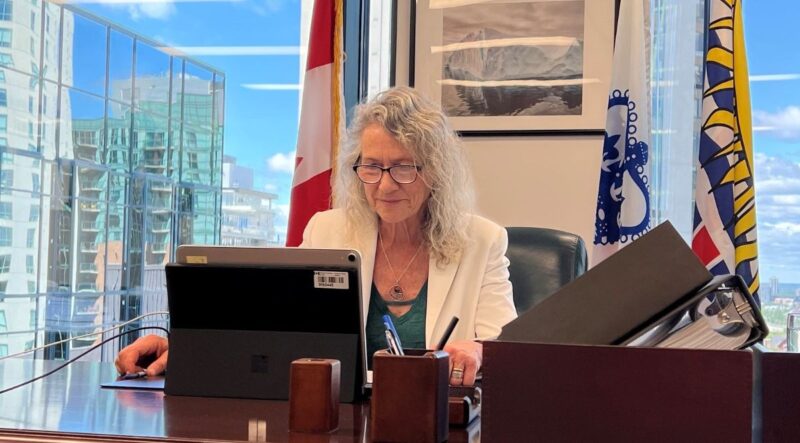Canada renews 79 licences for BC’s salmon farmers
Long awaited aquaculture announcement delivers a major blow to the science-deficit campaigns by anti-fish farming activists who want to shut down salmon farms in British Columbia.
By Fabian Dawson
SeaWestNews
Ottawa today announced a two-year renewal of aquaculture licences for 79 salmon farms in British Columbia that have been the target of a concerted fear-mongering campaign by anti-fish farm activists.
The licence renewals will allow the salmon farmers to continue to operate within the current regulations while a transition plan is being collaboratively developed to define the future of the industry, the Department of Fisheries and Oceans (DFO) said in a statement.
The statement was released late in the day without any notice – a practice to avoid immediate media scrutiny of a controversial decision by the government.
It however signals that the current Fisheries Minister Joyce Murray is placing more emphasis on the science around open-net fish farms rather than “social acceptance” of the marine operations – an issue her predecessor preferred, to get votes from the anti-fish farm lobby.
The renewal of these licences have been in limbo after former Federal Fisheries Minister Bernadette Jordan decided in Dec. 2020 to phase out 19 salmon farms in BC’s Discovery Islands, despite nine-peer reviewed scientific studies that showed the marine operations had virtually no impact on wild stocks migrating through the area.
Jordan also ignored her deputy minister’s recommendation for a more coordinated approach to the closures, which was primarily pushed for by the anti-fish farm activists, who had threatened the Trudeau Liberals that they would withhold their votes for the party.
The closure of salmon farms in the Discovery Islands, has already resulted in scores of people, including 80 at a fish plant in Surrey, losing their jobs.
The Federal Court last April ordered the government to set aside its decision to phase out the Discovery Islands salmon farms after reaffirming an earlier ruling that “salmon aquaculture in B.C. poses no more than a minimal risk to wild salmon.”
The government, however, in today’s announcement said it was not going back on its decision to phase out the 19 farms in BC’s Discovery Islands.
“Regarding finfish aquaculture facilities in the Discovery Islands, and in response to the April 22, 2022 Federal Court decision, DFO will conduct consultations with First Nations communities and current licence holders in the Discovery Islands on the future of salmon aquaculture licences in this area,” the statement read.
“These consultations will inform a final decision expected in January 2023 after considering input from all affected parties. While this process is underway, DFO will not reissue licences for Atlantic Salmon facilities in this area.”
SeaWestNews has been informed by a DFO source that Minister Murray wants more time to look at the emerging and new scientific data on the impact of salmon farms in the Discovery Islands, which have been operating in the area for over three decades with little impact on migrating wild stocks according to the Canadian Science Advisory Secretariat (CSAS).
“Until such time, she will work around the court order to set aside the decision and not allow restocking of the fish farms in the Discovery Islands…it will be done with the cooperation of the industry,” confirmed the DFO source.
The Canadian Aquaculture Industry Alliance (CAIA) and the BC Salmon Farmers Association (BCSFA) said that the decision to renew the licenses of the 79 salmon farms in British Columbia and establish a process for the salmon farms in the Discovery Islands is good for Canadians.
“The government’s own science evaluation process, and multiple independent peer-reviewed science processes, have concluded that salmon farms have minimal effect on wild fish abundance and that farmed and wild salmon can and do co-exist in the Pacific Ocean,” the associations said in a joint statement.
“This announcement will give us the opportunity to work with all levels of government, including First Nations, to secure a future that will benefit Indigenous and non-Indigenous coastal communities, meet the global demand for healthy, affordable seafood, and support the continuation in protection and restoration of wild Pacific salmon,” said Ruth Salmon, Interim Executive Director of the BC Salmon Farmers Association.
“While we are encouraged that the licences have been renewed, we genuinely needed a six-year license term that reflected our production cycle,” said Timothy Kennedy, President, and CEO of the Canadian Aquaculture Industry Alliance (CAIA).
“Longer license terms would have provided the confidence to further invest in innovation and technology, leading to continued operational and sustainable improvements, job creation for coastal communities, and greater food security,” he said.
“Today’s decision is an important validation of peer-reviewed science and procedural fairness. We will work with governments and partners to create long-term value to contribute to Canada’s Blue Economy and secure home-grown fresh food supply,” added Kennedy.
A source within the media and government relations group employed by the anti-fish lobby, said the decision is “a hard pill to swallow for the group”
“They had banked on the licences not being renewed and spent tens of thousands of dollars on the social media campaigns, despite our advice…internally they see it as a betrayal by the Liberals, but they will regroup,” she said.
The anti-open net fish farms activist groups in a statement said, “this decision does little to protect wild salmon outside the Discovery Islands over the next two years. Wild salmon runs remain at risk until the last salmon farm comes out of the ocean.”
(Facebook image of Fisheries Minister Joyce Murray on a call with her Norwegian counterparts)

